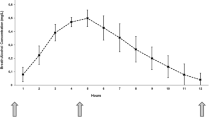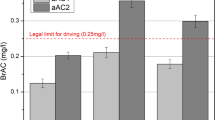Abstract
WHAT is the most important aim of evaluating the degree of drunkenness ? We think it is not to evaluate how much alcohol has been drunk or the alcohol level in the blood, but to determine how the central nervous system is affected by the intake of alcohol. This is because, as is generally known, even when the same amount of alcohol has been taken, there is not only a marked personal variation in the drunkenness induced but also a similarly marked variation, even in the same person, dependent on physical or mental conditions at the time the alcohol was consumed. According to a report1 on alcohol drunkenness, even 0.3 or 0.4 mg/ml. of alcohol in the blood affected the driving ability in many persons tested with the simulator or by actually driving a vehicle.
This is a preview of subscription content, access via your institution
Access options
Subscribe to this journal
Receive 51 print issues and online access
$199.00 per year
only $3.90 per issue
Buy this article
- Purchase on Springer Link
- Instant access to full article PDF
Prices may be subject to local taxes which are calculated during checkout
Similar content being viewed by others
References
Watanabe, M., Japanese–American conference on alcohol studies (Kyoto Symposium, 1968).
Goth, A., Medical Pharmacology (Mosby, St Louis, 1961).
Morikawa, Y., Nature, 213, 5078 (1967).
Morikawa, Y., et al., Arch. Environ. Health, 14, 614 (1967).
Author information
Authors and Affiliations
Rights and permissions
About this article
Cite this article
MORIKAWA, Y., MATSUZAKA, J., KUKATSUNE, M. et al. Plethysmographic Study of Effects of Alcohol. Nature 220, 186–187 (1968). https://doi.org/10.1038/220186a0
Received:
Issue Date:
DOI: https://doi.org/10.1038/220186a0
This article is cited by
-
Photoplethysmographic characterization of vascular tone mediated changes in arterial pressure: an observational study
Journal of Clinical Monitoring and Computing (2019)
-
Genetisch bedingte Variabilität des Alkoholstoffwechsels und ihr Einfluß auf Trinkverhalten und Neigung zum Alkoholismus
International Journal of Legal Medicine (1990)
-
Pharmacogenetics and ecogenetics
Experientia (1986)
Comments
By submitting a comment you agree to abide by our Terms and Community Guidelines. If you find something abusive or that does not comply with our terms or guidelines please flag it as inappropriate.



